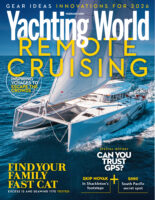Youngest America's Cup winner, Australian James Spithill, gives keynote speech
The third edition of the World Yacht Racing Forum began yesterday in Estoril, Portugal, with a Keynote address by the youngest America’s Cup winner, Australian James Spithill. “To succeed, our sport needs three elements: continuity, sustainability and a wider audience, he explained. This is the only way to provide a return on investment to the sports partners.”
Many of the day’s speakers, split in different debates, reached the same conclusion. “The main difference between our sport and yours is stability and long term agreements”, explained Pau Serracanta, the Managing Director of Dorna Sports SL, organisers of the Moto GP. “Our schedule is repeated year after year, the events take place at the same time and place, the sponsors are with us for the long term. Continuity is the key to our success.”
“Football is an ongoing business; Formula 1 is an ongoing business; sailing isn’t”, said Volvo Ocean Race CEO Knut Frostad. There shouldn’t be new events: we should consolidate what we have and improve, not diversify.” Eddie Owen, CEO of RORC agrees: “We have too many layers in the sport. Every part of it is important but it makes it difficult to sell.”
Today’s debates were chaired by specialists of marketing and brands, including Richard Moore, CEO of Capitalize, who told the audience that global sport sponsorship figures worldwide are growing again – yet sailing remains a marginal part of the growth. “The sport of sailing is not growing as it should”, confirmed Frostad. “Our objective is to take our event to the mainstream media; this is the key and our ambition is to double our visibility.”
Other event organisers have different priorities, for example Franck David (Multi One Design) who wants to promote the eco-friendliness of his new coming Class, Jim O’Toole (World Match Racing Tour) who ambitions to organise fifteen events worldwide and propose a more complete multimedia solution, or Luc Talbourdet (IMOCA) who wants to attract more international teams and skippers.
Taking his team BMW ORACLE Racing as an example, Spithill illustrated the fact that both the Volvo Ocean Race and America’s Cup managements agree on the fact that media coverage and television are paramount. “A very polished TV package will capture the audience”, he said. “Look at Nascar or the Tour de France. Those two events are very repetitive and have few exciting moments; yet they get a massive audience thanks to the quality of the TV production, the commentary and the technology involved.”
Another key factor is the personality of the athletes. “Motorbike racing wouldn’t reach such audiences without Valentino Rossi. Skiing has lost a lot since Alberto Tomba stopped his career. Cycling would be poor in the US without Lance Armonstrong…” observes Pau Serracanta. And sailing? “There are no big personalities in our sport”, considers Mark Turner, Executive Chairman, OC ThirdPole. “It’s a matter of opportunity: you can’t manufacture them.” A point of view Clifford Bloxham, Head of Athlete Representation, Octagon doesn’t share: his job is precisely to help build those personalities. “It is critical for the success of an athlete and an event to become a brand. The performance is key, but they also need to develop their key values and know where they will be in twenty years time. An athlete should develop his logo early on in his career, and have long-term vision.”
The discussion ended up with a commitment from some key race organisers to meet more regularly in order to share ways of growing the sport, possibly through ISAF.
Details of the conference programme and speakers are available on the event’s website: www.worldyachtracingforum.com




